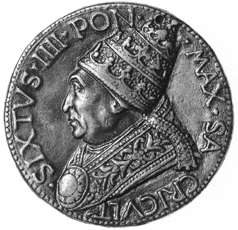 Original name Francesco della Rovere (b. 1414, Cella Ligure, d. 1484, Rome), pope from 1471 to 1484 who effectively made the papacy an Italian principality.
Original name Francesco della Rovere (b. 1414, Cella Ligure, d. 1484, Rome), pope from 1471 to 1484 who effectively made the papacy an Italian principality.
 Original name Francesco della Rovere (b. 1414, Cella Ligure, d. 1484, Rome), pope from 1471 to 1484 who effectively made the papacy an Italian principality.
Original name Francesco della Rovere (b. 1414, Cella Ligure, d. 1484, Rome), pope from 1471 to 1484 who effectively made the papacy an Italian principality.
Becoming a Franciscan, he subsequently taught and was chosen minister general of his order in 1464. He was made cardinal in 1467 by Pope Paul II, whom he succeeded on Aug. 9, 1471.
Neither a crusader nor curial politician, Sixtus aimed at the aggrandizement of his family and of the Papal States, subordinating his duties as the church's spiritual head in a manner characteristic of his era. Concurrently, the ideal of the crusade against the Turks was dying. In 1472, under Cardinal Oliviero Carafa, he sent a fleet that participated in the landing at the important Muslim stronghold of Smyrna, but a new expedition in 1473 failed. Sixtus IV's relations were strained with France, whose king Louis XI firmly upheld the Pragmatic Sanction of Bourges (1438), which had established the liberties of the French Church. His efforts in 1474 and 1476 to reunite the Russian Church with Rome and to gain Russian support against the Turks were unsuccessful.
Sixtus IV soon abandoned universal interests, concentrating on Italian politics and revealing his confirmed nepotism. His beneficiaries were members of his own family, whom he greatly enriched and who involved him in messy disputes, perhaps the worst of which was a conspiracy against Lorenzo (the Magnificent) de' Medici. On April 26, 1478, during mass at Florence cathedral, the agents of Girolamo Riario, Sixtus IV's nephew, wounded Lorenzo and killed his brother, Giuliano, in a plot to overthrow the Medici. Although Sixtus endorsed the plot, he did not approve of assassination. Out of this scandal and its counteraction, he justifiably managed to excommunicate Lorenzo, to put Florence under interdict, and to induce King Ferdinand I of Naples, the papacy's ally, to declare a fruitless and inglorious war that kept Italy confused for two years. In 1480 Lorenzo boldly made peace with Ferdinand, despite Sixtus, who maintained war between the papacy and Florence. He finally absolved Lorenzo and removed the interdict.
Apart from meddling in feuds between the great Roman families, Sixtus IV committed himself rather scandalously to Venice's aggression against the kingdom of Ferrara, which he incited the Venetians to attack (1482); their combined assault was intervened by Milan, Florence, and Naples. For refusing to desist from the hostilities that he had instigated and for appearing to be a dangerous rival to the Papal States, Sixtus placed Venice under interdict in 1483.
In ecclesiastical affairs, Sixtus IV instituted for the Roman Church the feast (December 8) of the Immaculate Conception of the Blessed Virgin Mary. He formally annulled (1478) the decrees of the Council of Constance and condemned (1482) abuses in the Spanish Inquisition. He granted many privileges to the mendicant orders, particularly to his own Franciscans.
Above all, he was a founder or restorer of important institutions and a patron of arts and letters. He established and richly endowed the first foundling hospital and repaired and built numerous Roman churches (including Sta. Maria del Popolo and Sta. Maria della Pace); the Sistine Chapel is his principal monument. He commissioned such great artists as Sandro Botticelli and Antonio del Pollaiuolo and pensioned such eminent men of learning as Bartolomeo Platina. From 1471 he was the second founder of the Vatican Library, which he opened for scholars. These outstanding achievements, however, were accomplished with heavy taxation and simony.
 | |
| © Web Gallery of Art, created by Emil Krén and Daniel Marx |